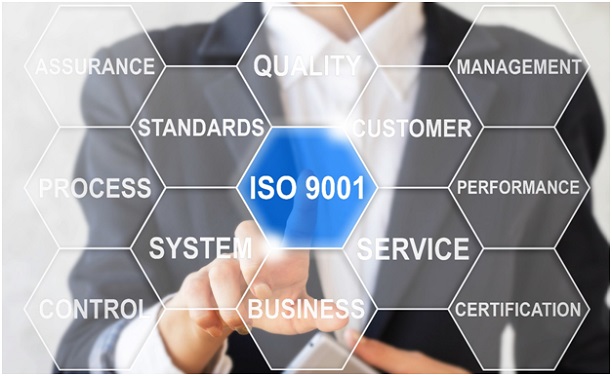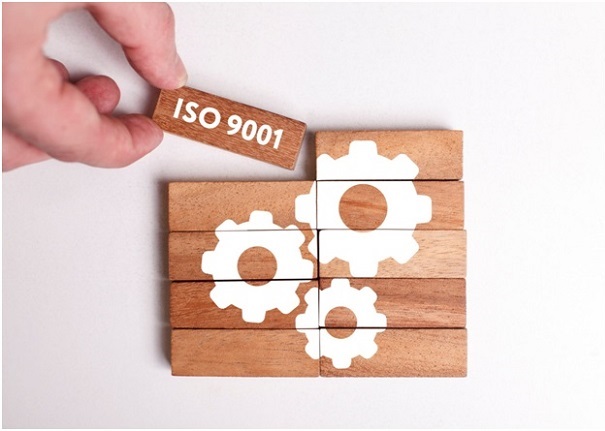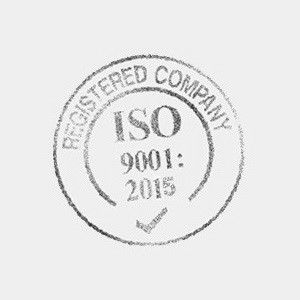ISO 9001 is not a legal requirement. Although recognized as important in many industries, companies may operate without the certification.
ISO 9000 is a series of standards to ensure that a business is upholding and working towards improved quality in every aspect of their business. This set of standards is used as a quality management system to provide the best products and services to a client. The ISO 9001 standard, in particular, requires certification.
This certification does help in maintaining many legal requirements that companies face to ensure quality, but the standard itself is not required.
ISO 9001 is followed by a significant number of companies in many countries across the world. It allows companies to maintain high standards of quality assurance and is recognized as an important indicator of a company’s commitment to running their business in an efficient manner.

ISO 9001 is the only standard in the ISO 9000 series that requires a certification. ISO 9000 defines the standards for quality management and ISO 9001 maps out the requirements for meeting these standards.
While many companies abide by these principles, ISO 9001 is not a legal requirement to operate a business. Many companies do benefit from being ISO 9001 certified.
ISO 9001 is a quality management system (QMS) that allows businesses to keep a high level of productivity and quality while delivering products and services to customers. Quality is not associated with a specific product that is sold, but is applied to the process that goes into making this product.
All aspects of a supply chain and operation in a business are compared to the ISO 9001 standards to ensure that quality is upheld.
The standards that need to be met in this system are focused on:
Details in all of these areas are required to maintain a ISO 9001 certification. In order make sure these standards are met, companies undergo an audit. This audit is driven by a third party to ensure objectivity.
The auditors will test all these metrics to ensure a company is following the standards laid out in the ISO 9001 guidelines. Having this certification can be very beneficial to a company’s success and reputation.
While no company needs a certification to operate, many companies will find significantly greater success if they are certified.
The ISO 9001 is applicable in both production and service industries. Quality management can be very useful in manufacturing and customer-based companies.
All of these industries either operate hardware processes to bring value to customers or are highly service-based. With many working parts across all areas of the business, these industries would see substantial improvements in efficiency if they are held to ISO 9001 standards.
All companies will benefit from such adherence, but these specific industries should most definitely be incorporating these policies.
Especially with businesses that involve manufacturing or significant customer contact, there are always ways to evaluate efficiency and quality inspection in order to deliver the best product or service to the client or customer.

Like any route to obtaining certification, there are certain steps you must follow in order to be properly accomplish this goal.
While there are specific steps, the ISO quality management system leaves some freedom for decisions that make the most sense for your organization.
When first deciding to become certified, there are different approaches one can take in terms of implementation.
You must decide who will be in charge of implementing and executing the certification. Appointing a specific person will help make sure the company stays on track.
Some companies choose to appoint an in-house lead for certification, which keeps costs low but requires significant energy from an employee. Others will hire a consultant, which will hasten the rate at which the certification is completed, but this can be costly to a company and separate the process and its value from Top Management.
There should be one person within the company (the Project Manager) responsible for ISO 9001 monitoring and scheduling management reviews to ensure the requirements are met.
ISO 9001 is designed to improve and ensure quality throughout all processes in an organization.
This implementation may result in changes for how your firm is currently operating. Change can often be threatening or unwelcome by management and employees. When deciding to implement these standards, it is important to keep your team in the loop!
Both Top Management and all employees should be aware of the new standards and well as their impacts.
Keeping people informed early, showing them what changes will be made, and how they will positively benefit the firm will allow for support. Including everyone in the process early will result in less push back. Without support, standards will be difficult to execute.
Quality looks different in every firm. Some processes may be successful in some businesses but not others. Documentation is a key aspect of certification, but it is specific to an organization.
This is meant to detail the way in which procedures should be conducted in order to reach maximum quality. Giving clear descriptions of how you wish processes to work will keep standards consistent.
Being prepared for all processes and how they should be executed will result in more efficiency across all aspects of the business. It also keeps employees and the firm accountable! They have something to compare themselves to and push toward continued improvement.
While each set of documents is specific to a firm, they should all include: a policy regarding quality, a flowchart of how these plans are executed, instructions for jobs, goals and objectives, and clear procedures.
The only requirement is that a firm must abide by their documents to maintain certification. This means that rules and regulations should be meaningful to the success of the organization and not implemented without a clear and effective purpose.
Writing these documents is very straightforward with the use of templates such as our ISO Quality Manual Template.
Start simple. Explain to employees how the documents should be adhered to and the clear benefits
Then begin to teach and show employees what changes must be made to meet these standards.
This will require a “retooling” of work processes and instructions. It may be helpful to get input from employees beforehand to see how they best think changes can be made to add value. Including employees in the process will also enhance support.
An audit is used to ensure that the plans created are actually being followed. Internal audits should be conducted within the company to make sure requirements are met.
Those performing the audit should be well-versed in ISO 9001 regulations and auditing. Auditing skills can be acquired easily through good training.
Having multiple auditors is a good idea to provide more input and perspectives in making sure all standards are met.
The internal audit is a good tool to ensure you are adhering to standards. To officially obtain ISO 9001 certification, an outside and objective auditor is required.
They will come to a company and randomly observe and check that departments are adhering to requirements.
You will also need to select a third-party registrar to execute the certification. Make sure this body is accredited as there are many companies providing this service. If there are significant issues with the audit, there is an opportunity to fix them and obtain certification after they are resolved.
You can prepare employees by making sure they are well-versed in their job functions and procedures. This will allow for a more successful audit.
If your system is designed correctly, it should continually improve upon itself. Your registrar will perform audits at least once a year to ensure the requirements are still being met as time passes.
It is quite easy to lose your certification if attention is not continually paid to the maintenance of quality. A primary purpose of this certification is to continually improve upon procedures to increase efficiency.
Following each of these steps is important in obtaining certification and keeping it! Always keep the best interest of your employees and your end user in mind. Efficiency and quality benefits the firm both internally and externally.

ISO certification is beneficial for companies because it instills trust in the company and establishes a reputation of quality!
Industry leaders and consumers will recognize this certification as a commitment to constant improvement and efficiency. This creates a positive relationship on both the business and client-side.
Customers will know they are receiving a product or service that is built upon high standards! Similarly, companies will be opened up to a larger client base who only work with ISO 9001-certified firms.
ISO 9001 certification is great marketing tool to raise brand value. Taking the time to become certified and stay committed to its goals will only enhance your firm’s image and reputation for clients and other businesses!
Becoming certified is another step in raising profits and delivering a valuable product!
Learn More about ISO 9001
- What is the Meaning of 9001 in ISO 9001?
- Is ISO 9001 a Legal Requirement?
- Can an Individual be ISO 9001 Certified?
- Assertive Vs Argumentative in ISO 9001 - What's the Difference?
- How to Check if a Company is ISO 9001 Certified
- Ineffective Management Review example
- How many Clauses are in ISO 9001 Certification? (Hint, there are 10!)
- Does ISO 9001 Certification Need to be Renewed?
Updated: 14th May 2022
Author: Richard Keen

Richard is our Compliance Director, responsible for content & product development.
But most importantly he is ISO's biggest fanboy and a true evangelist of the standards.
Learn more about Richard